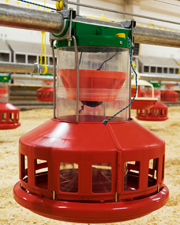Equine
Symptoms of mycotoxicosis Sub-Clinical:
- Increased susceptibility to disease
- Hypersensitivity
Symptoms of mycotoxicosis Clinical:
- Reduced growth rates
- Decreased appetite
- Poor performance
- Colic
- Respiratory problems
- Reduced reproductive performance
- Brain lesions, neurological disorders
- Organ damage especially liver, kidneys
- Paralysis
The growing effect of unknowingly feeding small levels of mycotoxins may also contribute to a gradual deterioration of organ functions. This inevitably affects growth rate, feed efficiency, fertility, respiration rate, the capability to perform work, and mortality.
Other aspects will also impact the horse when it comes to mycotoxin exposure, including age, workload, stress level, nutritional status and immune status of the horse. Hard working or lactating horses are expected to have much higher amounts of cereal-based concentrate feeds.
Raising the standard of feed quality is important for reducing mycotoxin levels in equine diets. Moldy feeds should not be fed to horses even though the mycotoxins contamination is unknown. Additionally, mycotoxins may be found in equine bedding such as straw.


